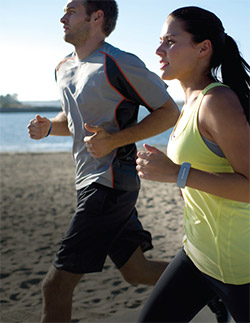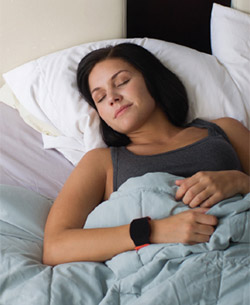
New Report Finds People Willing to Share Personal Health Data with Researchers, Companies
Published Date
By:
- Tiffany Fox
Share This:
Article Content

A new report from the California Institute for Telecommunications and Information Technology (Calit2), supported by the Robert Wood Johnson Foundation, suggests that many people who track health-related data with wearable devices and smartphone apps are interested in sharing that data with researchers in medical and public health—provided adequate privacy controls exist.
The report, titled “Personal Data for the Public Good: New Opportunities to Enrich Understanding of Individual and Population Health,” also indicates that a large number of researchers are eager to access and use self-tracking data to fill in gaps in more traditional clinical data collection, although doing so will require new research methodologies and business models for companies which deal in such data.
The report was prepared by the Health Data Exploration project at Calit2 using a convenience sample of individuals and researchers who are already generating or using digital self-tracking data. Among survey respondents, the five most common health conditions tracked were exercise, diet, weight, athletic activity and sleep.
“Behavioral research has always depended on observations made in the laboratory or the clinic,” said Robert Kaplan, a member of the Health Data Exploration Advisory Board and Associate Director for Behavioral and Social Sciences at the National Institutes of Health. “Now we can bring the laboratory to the person in his or her own environment. This greatly enhances the opportunity to learn about the determinants of behavior in the natural environments of everyday life.”
The Health Data Exploration project, which is funded by the Robert Wood Johnson Foundation, is exploring how to bridge the “worlds” of health researchers, the set of mostly private and often small technology companies that hold these data, and individuals who may want to donate their own health or medical data.
“We are encouraged to discover a willingness of a large number of behavioral and social scientists to partner with data scientists to delve into the depths of consumer-generated data,” said Lori Melichar, Senior Program Officer at the Robert Wood Johnson Foundation. “We are hopeful that we will be able to facilitate mutually beneficial partnerships between companies and researchers that can produce new insights into perplexing health challenges.”

Sharing Personal Health Data
Among individuals surveyed, the dominant condition (57%) for making their personal health data available for research was an assurance of privacy for their data, and over 90 percent of respondents said that it was important that the data be anonymous. On the whole, survey participants said they would be more likely to share their data if they knew that it would only be used for public good research.
"We have known for a long time that altruism is a big reason why individuals participate in research studies that contribute to the common wealth, notably by evaluating new pharmaceuticals or medical devices,” said Dr. Kevin Patrick, a professor of Family and Preventive Medicine in the University of California, San Diego School of Medicine and a lead author of the report with Qualcomm Institute Chief of Staff Jerry Sheehan. “It's reassuring to see this same attitude applied to these new forms of health data."
A Growing Area of Research
Forty-six percent of the researchers interviewed for the report have already used self-tracking data in their research, and 23 percent have already collaborated with application, device or social media companies. These findings expand on a series of reports that have emerged in the past few years from the Pew Foundation, the Institute of Medicine and others, all of which point to what Patrick calls “a landscape of opportunity” for using ‘big data’ to improve public health.
Patrick cautions, however, that from a research standpoint, the increasing volume of self-tracked data across large groups of people – for example people who use Fitbit™ to track their physical activity – raises entirely new methodological issues for researchers. “The amount of data captured by these devices and apps dwarfs anything that we have ever had before. New computational and analytical strategies will need to be applied that have not commonly been used in health-related research," he said.
Methodology
We conducted surveys to understand attitudes and experiences with self-tracking data for both individuals and researchers. The individual survey was taken by 465 participants. The researcher survey was taken by 134 participants. At the end of the surveys for individuals and researchers, we asked participants if they would be willing to be contacted to participate in follow-up interviews. We interviewed 11 individuals and 9 researchers. We also interviewed 15 companies/key informants.
It is important to note the inherent bias of respondents in a convenience sample, particularly as our goal was to access individuals and researchers who are already generating or using digital self-tracking data. Further, participants tended to have more education and higher household incomes than the general population. Our survey also drew slightly more white and Asian participants and more female participants than in the general population.
In addition to the challenges of dealing with the complexity of more data, Patrick says that researchers and bio-ethicists also need to consider carefully the appropriate ethical model for assessing the rights and responsibilities of individuals who are sharing their personal data. These considerations, which require additional qualitative research to better understand the expectations for privacy for personal health data, will help guide future policy considerations regarding informed consent.
Geoffrey C. Bowker, a professor in the Department of Informatics at UC Irvine and a founding member of the social science Big Data Council, concurs.
"The emergent field of the Quantified Self (QS) holds the possibility of transforming the generation and deployment of data about ourselves—and thereby of informing the generation of medical knowledge. Understanding how and why people use QS and how changing attitudes to privacy affect QS data is a core task for social scientists in this domain working with both design and policy communities."
The Business Case
Opportunities and obstacles for using personal health data also exist from a business perspective. Through a series of interviews, the report found that although companies which deal in such data consider advancing research a worthy goal – especially if that research validates the utility of their device or application – their primary business concern is maintaining their customer relationships. A number of companies interviewed were open to data sharing with academics, but noted the slow pace and administrative burden of working with universities as a challenge.
Companies are already emerging to meet that challenge, according to the report. San Diego-based Small Steps Labs has developed a software platform called Fitabase that collects data from Internet-connected consumer devices and allows anyone – including researchers – to aggregate, analyze and export data gathered from people wearing the devices.
“You could say my entire company and product exist because of these new friendly consumer wearable sensors like the Fitbit,” said Fitabase CEO and Founder Aaron Coleman. “People are (rightfully so) skeptical of health tools that are one-size-fits-all and don't attempt to understand them. Greater access to data helps us make more relevant tools that fit the lifestyle of the person who is engaging our tools to better their health.” Prior to founding Fitabase, the UC San Diego alumnus (B.S. ’06) led a software development team in Calit2’s Center for Wireless and Population Health Systems, which designed several systems and platforms used for health related research.
Share This:
You May Also Like
Stay in the Know
Keep up with all the latest from UC San Diego. Subscribe to the newsletter today.



